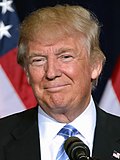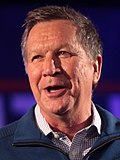Analysis
The Louisiana primary was called for Trump by the Associated Press about half an hour after the polls closed. [2] Trump's victory in Louisiana was seen as evidence against the argument, made by some of his critics, that he would do worse in a closed primary, in contrast to his defeat in the Kansas caucus that was held the same day. [5] It was also viewed as an opportunity to see whether Cruz's campaign was gaining momentum, and whether Cruz was well-positioned to defeat Trump and win the nomination. [1] Trump's relatively narrow victory over Cruz, whom he beat by less than four percentage points, contrasted with many polls of Louisiana in which he had a double-digit lead over Cruz. However, the fact that Trump won the state at all was in line with the results of every primary poll conducted there. [6]
Among those who voted early in the primary, Trump beat Cruz by almost 24 points, but Cruz defeated Trump among those who voted on Election Day, which led the race to be relatively close statewide. The stark contrast between early and Election-Day results led to the Louisiana primary facing criticism from critics of early voting. Trump's strong performance among those who decided who they wanted to vote for further in advance of the primary in Louisiana was different from most previous contests, in which Rubio had generally done better among early deciders. [7]
On December 23, 2015 the Donald J. Trump campaign announced that political advisor Ryan Lambert was selected as Louisiana's Campaign State Director. [8]
Delegate dispute
Initially, because the race in Louisiana was relatively close (Trump won by only 3.6%), Trump and Cruz each received 18 of the state's 46 delegates. Marco Rubio won five more delegates, and the remaining five were "unbound", meaning they could choose to support whichever candidate they wanted. [9] After Rubio withdrew from the race, the five Louisiana delegates that had been pledged to him became "free agents" who, like the five previously unbound delegates, were expected to support Cruz. [10]
In March 2016, it was reported that, despite having lost the Louisiana primary to Trump, Cruz could get more of the state's delegates overall, because he could receive support from more of Louisiana's unbound delegates than was Trump. Despite the reporting of their support to Cruz, a majority of Rubio's delegates rebuked the false reporting and voted with Donald J. Trump. [11]
In response, the Trump campaign announced that they would challenge the delegate distribution in Louisiana, with Trump himself tweeting that a "lawsuit" would be coming. Trump campaign senior adviser Barry Bennett responded by saying that Trump was referring to a "decertification process" that the campaign would pursue through the Republican National Committee. [12]
In response to Trump's claims, Republican Party of Louisiana executive director Jason Dore stated in March 2016 that the proportional delegate allocation rules for Louisiana's primary were adopted before Trump announced his presidential candidacy, and that it was too late by then to change them. Dore also said that Cruz was not going to receive more delegates than Trump, adding, "Everybody's been allocated what they're going to be allocated." [13]
This page is based on this
Wikipedia article Text is available under the
CC BY-SA 4.0 license; additional terms may apply.
Images, videos and audio are available under their respective licenses.





